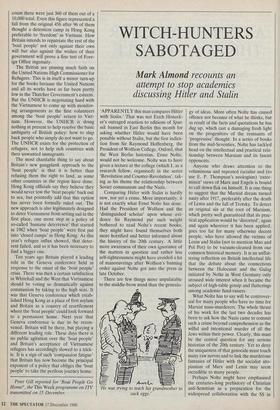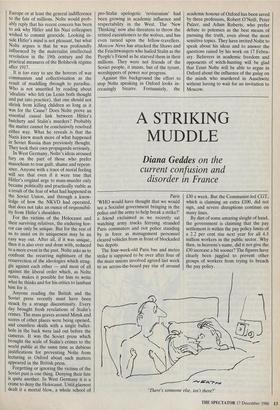WITCH-HUNTERS SABOTAGED
Mark Almond recounts an
attempt to stop academics discussing Hitler and Stalin
`APPARENTLY this man compares Hitler with Stalin.' That was not Erich Honeck- er's outraged reaction to editions of Sput- nik banned in East Berlin this month for asking whether Hitler would have been possible without Stalin, but the first indica- tion from Sir Raymond Hoffenberg, the President of Wolfson College, Oxford, that the West Berlin historian, Ernst Nolte, would not be welcome. Nolte was to have given a lecture at the college (which I, as a research fellow, organised) in the series `Revolution and Counter-Revolution', tak- ing as his theme the relationship between Soviet communism and the Nazis.
Comparing Hitler with Stalin is hardly new, nor yet a crime. More importantly, it is not exactly what Ernst Nolte has done. Had the President of Wolfson and the 'distinguished scholar' upon whose evi- dence Sir Raymond put such weight bothered to read Nolte's recent books, they might have found themselves both more horrified and better informed about the history of the 20th century. A little more awareness of their own ignorance of the matters in question and rather less self-righteousness might have avoided a lot of manoeuvrings after Wolfson's banning order against Nolte got into the press in late October.
There are few things more unpalatable to the middle-brow mind than the genealo- 'He was trying to teach his grandmother to suck eggs.' gy of ideas. More often Nolte has caused offence not because of what he thinks, but as result of the facts and quotations he has dug up, which cast a damaging fresh light on the progenitors of the remnants of `progressive' thought. In a series of books from the mid-Seventies, Nolte has tackled head on the intellectual and practical rela- tionship between Marxism and its fascist opponents.
Anyone who draws attention to the voluminous and repeated racialist and (to use E. P. Thompson's neologism) `exter- minist' views of Marx and Engels is bound to call down flak on himself. It is one thing to suggest that the Marxist dream turned nasty after 1917, preferably after the death of Lenin and the fall of Trotsky. To detect an original sin at the root of Marxism, which pretty well guaranteed that its prac- tical application would be `distorted', again and again wherever it has been applied, goes too far for many otherwise decent people, who have allowed the victims of Lenin and Stalin (not to mention Mao and Pal Pot) to be vacuum-cleaned from our common historical memory. It is an unflat- tering reflection on British intellectual life that the debate about the connections between the Holocaust and the Gulag initiated by Nolte in West Germany only aroused wide interest when it became the subject of high-table gossip and flutterings among academic fund-raisers.
What Nolte has to say will be controver- sial for many people who have no time for Marxist mass-murderers. The whole thrust of his work for the last two decades has been to ask how the Nazis came to commit such a crime beyond comprehension as the wilful and intentional murder of all the Jews within their power. Clearly, this must be the central question for any serious historian of the 20th century. Yet to deny the uniqueness of that genocide must touch many raw nerves and to link the murderous fantasies of Hitler with the socialist uto- pianism of Marx and Lenin may seem incredible to many people.
Perhaps Nolte might have emphasised the centuries-long prehistory of Christian anti-Semitism as a preparation for the widespread collaboration with the SS in Europe or at least the general indifference to the fate of millions. Nolte would prob- ably reply that his recent concern has been to ask why Hitler and his Nazi colleagues wished to commit genocide. Looking in- side Hitler's mind is not pleasant, but what Nolte argues is that he was profoundly influenced by the materialist intellectual revolution in the 19th century and the practical measures of the Bolshevik regime after 1917.
It is too easy to see the horrors of war communism and collectivisation as the result of muddling through to paradise.
Who is not unsettled by reading about 'idealists' who felt (as Lenin both thought and put into practice), that one should not shrink from killing children so long as it was for the Cause? Does Nolte prove an essential causal link between Hitler's butchery and Stalin's murders? Probably the matter cannot be conclusively resolved either way. What he reveals is that the Nazis knew much more of what happened in Soviet Russia than previously thought.
They took their own propaganda seriously.
In West Germany, Nolte's ideas aroused fury on the part of those who prefer masochism to true guilt, shame and repent- ance. Anyone with a trace of moral feeling will see that even if it were true that Hitler's original urge to mass-murder only became politically and practically viable as a result of the fear of what had happened in the Soviet Union, and through a know- ledge of how the NKVD had operated, that does not take an ounce of responsibil- ity from Hitler's shoulders.
For the victims of the Holocaust and their surviving relatives, the enduring hor- ror can only be unique. But for the rest of us to insist on its uniqueness may be an easy way out. After all, if it was unique, then it is also over and done with, reduced to a mere event in the past. Nolte asks us to confront the recurring nightmare of the resurrection of the ideologies which strug- gle 'against each other — and most of all against the liberal order which, as Nolte notes, makes it possible for him to write what he thinks and for his critics to lambast him for it.
Anyone reading the British and the Soviet press recently must have been struck by a strange discontinuity. Every day brought fresh revelations of Stalin's crimes. The mass graves around Minsk and scores of other places were being opened, and countless skulls with a single bullet- hole in the back were laid out before the cameras. It was the Soviet press which brought the scale of Stalin's crimes to the world public at the same time as dubious Justifications for preventing Nolte from lecturing in Oxford about such matters appeared in the British press.
Forgetting or ignoring the victims of the Soviet past is one thing. Denying their fate is quite another. In West Germany it is a crime to deny the Holocaust. Until glasnost dealt it a mortal blow, a whole school of pro-Stalin apologetic 'revisionism' had been growing in academic influence and respectability in the West. The 'New Thinking' now also threatens to throw the retired executioners to the wolves, and has even turned upon the fellow-travellers. Moscow News has attacked the Shaws and the Feuchtwangers who hailed Stalin as the People's Friend as he starved them in their millions. They were not friends of the Soviet people, it insists, but of the tyrant, worshippers of power not progress.
Against this background the effort to stop Nolte speaking in Oxford looks in- creasingly bizarre. Fortunately, the academic honour of Oxford has been saved by three professors, Robert O'Neill, Peter Pulzer, and Adam Roberts, who prefer debate to polemics as the best means of pursuing the truth, even about the most sensitive topics. They have invited Nolte to speak about his ideas and to answer the questions raised by his work on 17 Febru- ary. Believers in academic freedom and opponents of witch-hunting will be glad that Ernst Nolte will be able to argue in Oxford about the influence of the gulag on the minds who murdered in Auschwitz without having to wait for an invitation to Moscow.



























































 Previous page
Previous page